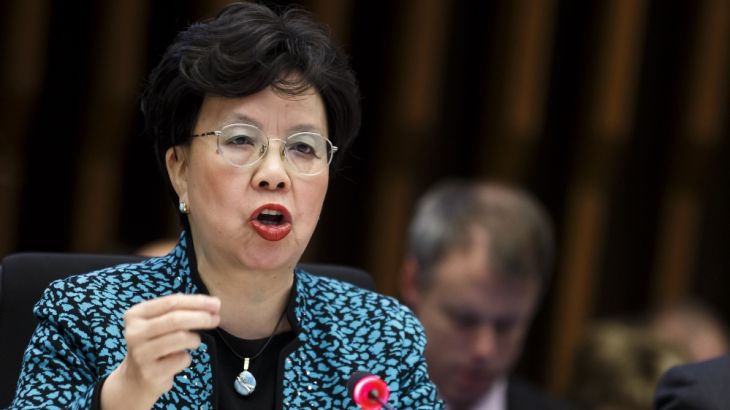WHO chief admits significant failings in Ebola response
Director General Margaret Chan says organisation did not have proper systems in place to combat severe health emergency.

The World Health Organisation (WHO) has admitted that the Ebola outbreak in West Africa revealed “inadequacies and shortcomings” in how it responds to crises.
Director General Margaret Chan told WHO’s executive board in Geneva on Sunday that the organisation had failed to deliver the necessary administrative, managerial and technical responses to the outbreak.
Keep reading
list of 4 itemsEurope endured record number of ‘extreme heat stress’ days in 2023
Deadly Sahel heatwave caused by ‘human-induced’ climate change: Study
Woman, seeking loan, wheels corpse into Brazilian bank
“[The WHO] did not have the systems and capacities in place to respond to a health emergency that was both severe and sustained,” she said.
The organisation saw its overall budget cut by a third in 2011 – one reason given for its slow response to the Ebola outbreak – but Chan said there was also a need to make the body more streamlined.
“We need to apply the ‘one WHO’ approach,” she told the executive board. “All three levels of the organisation [must] use the same standard operating procedures, tools, and frameworks for risk assessment, monitoring, and accountability during emergencies.”
The WHO has been criticised for what has been described as its slow response to the Ebola outbreak in West Africa.
More than 8,500 people have died since the start of 2014 from the virus, mainly in Sierra Leone, Liberia and Guinea.
|
|
Established as part of the UN in 1948, the WHO’s stated role is to provide leadership and technical support to the world’s governments on matters critical to human health.
Currently, however, that role does not explicitly include maintaining and promoting global health security.
The executive board’s three-day meeting in Geneva is looking at a number of proposals to reform the body.
Possible initiatives include the creation of a rapid-response team to deploy when an outbreak like Ebola occurs, streamlined recruitment procedures and the creation of a special fund dedicated to public-health emergencies.
Charles Clift, a global health security analyst at the UK-based think tank Chatham House, and author of a report on reforming the WHO, said organisational changes were desperately needed.
“It is an important function of the WHO to be the leading body in trying to take the right steps when an outbreak occurs,” he said.
The WHO has also been criticised over the source of its funding, with a few rich countries and groups like the Bill and Melinda Gates Foundation now providing a large part of its budget.
“If those countries decide to do something then they can essentially bring about change in the organisation,” Clift said.
“If they are happy with the status quo, or not sufficiently motivated to change it, the organisation will stay as it is.”